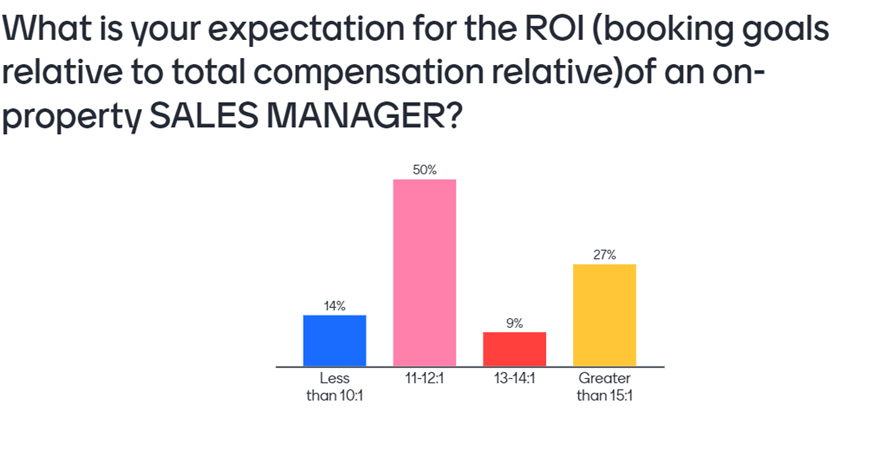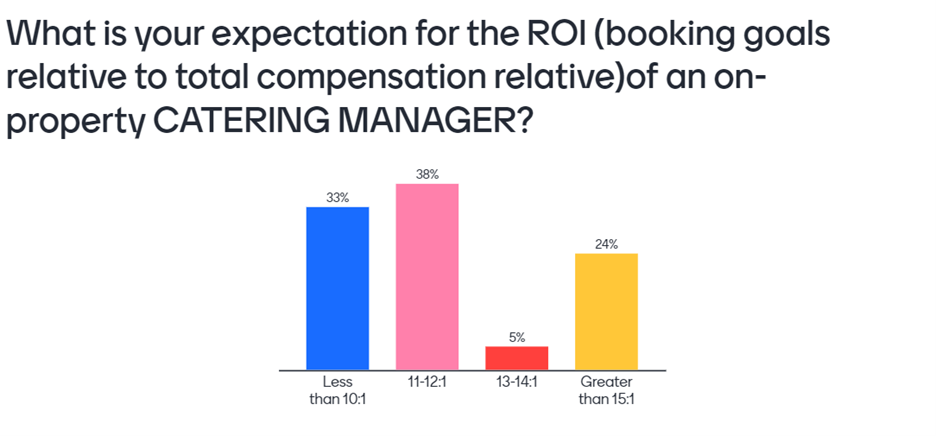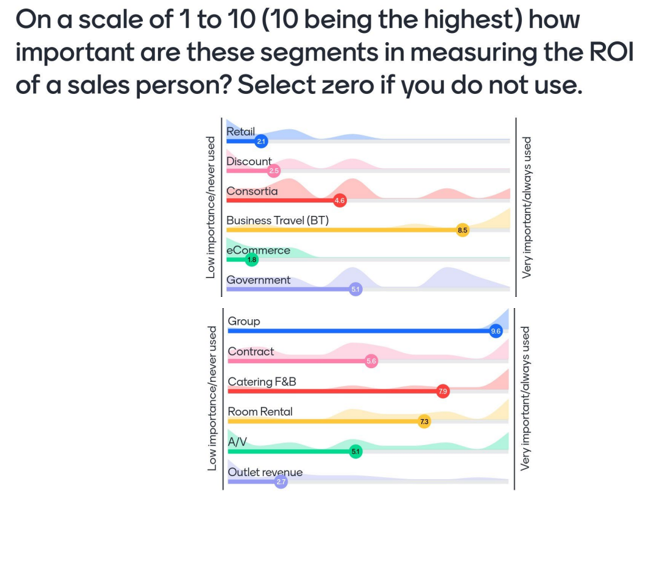Hotel management company sales and marketing executives recently gathered to share their insights and experiences on sales productivity and return on investment (ROI) during a recent virtual HSMAI Hotel Management Company Sales & Marketing Executive Roundtable. We used findings from our latest research survey as the jumping off point, discussing the expectation of ROI for sales managers, unique attributes of ROI formulas, and best practices. The conversation provided valuable insights into the challenges and strategies employed by hotel companies to optimize sales productivity.
Customized Approach to ROI
One key point of discussion was the expectation for ROI for sales managers. From our survey, the responses varied, with a majority falling within the 11-12: 1 ratio for on-property sales managers, and a slightly lower <10-12: 1 range for catering managers.

 However, participants emphasized when calculating ROI considering each company’s specific circumstances, such as the size of the hotel, market segment, and average rate. Notably, turnover is also a critical factor, highlighting the importance of accounting for potential staff changes throughout the year.
However, participants emphasized when calculating ROI considering each company’s specific circumstances, such as the size of the hotel, market segment, and average rate. Notably, turnover is also a critical factor, highlighting the importance of accounting for potential staff changes throughout the year.
Complexities of Measuring ROI
There was a rich conversation regarding the unique attributes and variables used in ROI formulas. Market segment, average daily rate, business travel, group contracts, catering, and room rental were among the factors frequently mentioned. The discussion shed light on the complexities of measuring ROI accurately, considering the diverse nature of the hotel companies and the varying dynamics between different sales roles. Below are the survey results on the importance of segments when measuring ROI.

Hybrid and Remote Sales Team
The conversation touched upon the topic of remote sales managers, revealing differing perspectives. While some participants believed that remote sellers performed at a higher level due to fewer interruptions, others mentioned encountering pushback from operators and general managers in adopting remote sales positions. As discussed in the HSMAI Foundation’s State of Talent report, the hybrid model is emerging as a popular approach.
5 Best Practices
- Sales productivity: Focus on improving sales productivity and then explore ways to enhance efficiency and effectiveness in sales processes and activities.
- Turnover calculation: When setting goals, factor in the turnover rate within the sales team throughout the year. Consider adding a percentage on top of the goals to accommodate expected turnover.
- Lead qualifying and response time: Recognize the challenge of longer lead response times due to staffing struggles and develop effective qualification processes to manage increased leads.
- Market-specific ROIs: Adjust ROI calculations based on demand within the hotel and the market.
- Revisiting goals: Since historical data is no longer accurate, allow flexibility in goal setting by revisiting goals within the year based on changing market conditions and demands.
By considering these insights and best practices, sales teams can work towards improved sales productivity, goal setting, and ROI.
Many thanks to Kalibri Labs for sponsoring this roundtable and for all the participant companies: Aimbridge Hospitality; Atlific Hotels; Atrium Hospitality; Blue Water Development; COHO Services; CoralTree Hospitality; Crescent Hotels and Resorts; First Hospitality; GF Hotels & Resorts; Giri Hotel Management; Greenwood Hospitality/Hotel Equities; Kessler Collection; Lodging Dynamics Hospitality Group; Pacifica Hotels; Parks Hospitality Group; Peachtree Hospitality Management; PM Hotel Group; Regency Hotel Management; Remington Hotels; and Vesta Hospitality.
